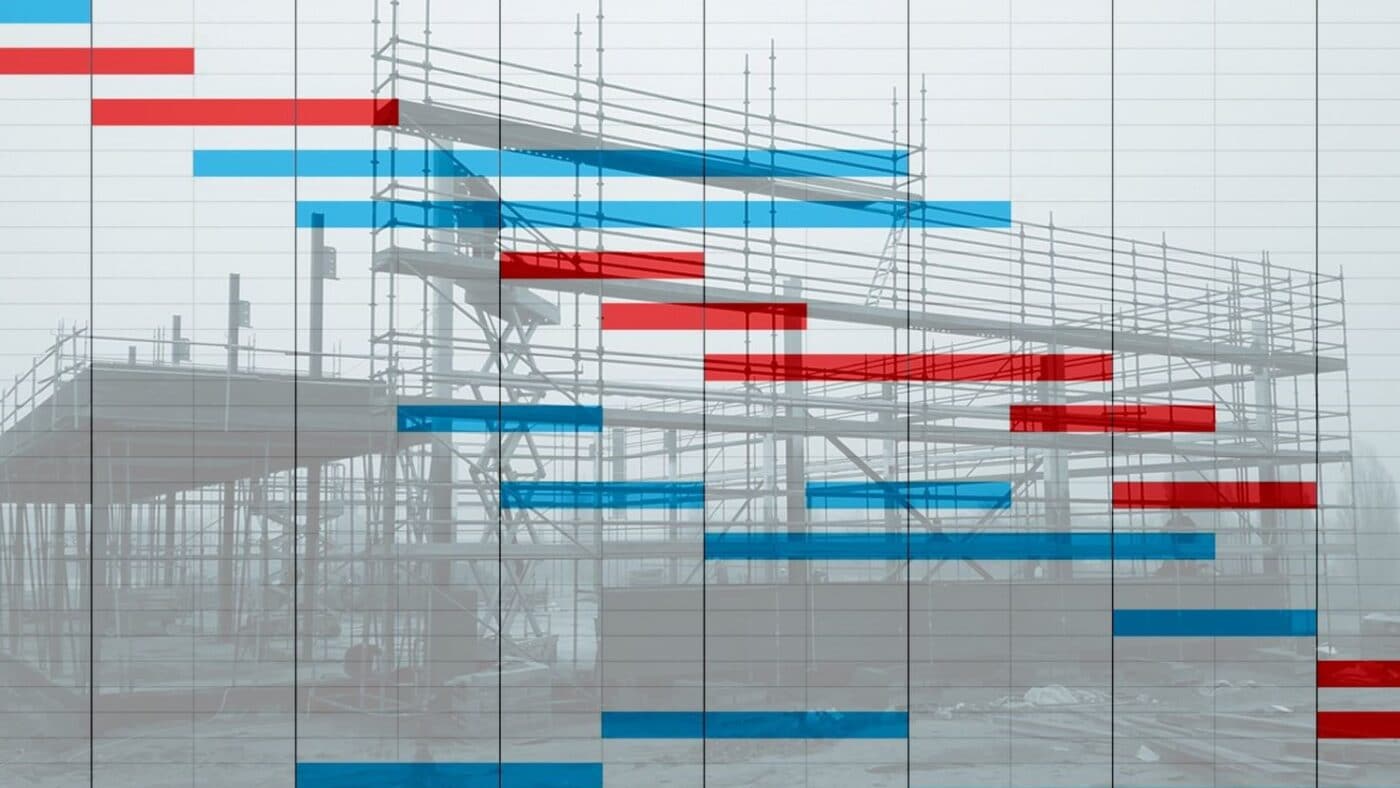Navigating the challenges of taking over a failed construction project requires a great deal of planning, preparation, and process. One critical component of laying the foundation for success is a completion schedule. The reason? A completion contractor risks being contractually tied to the failed project’s existing schedule if they choose not to produce their own schedule.
In this article, we offer practical insight into the what, why, when, and how of completion schedules. The information we share here can help answer the most important first question when it comes to a completion schedule:
- Should I build my own schedule from scratch?
- Should I revise the existing schedule?
- Should I offer to accept the existing project schedule?
What is a Completion Schedule?
A completion schedule is a remodeled or completely remade schedule produced by the completion contractor after project takeover. Completion schedules are similar to baseline schedules in the sense that they are the completion contractor’s first submitted schedule, upon which each subsequent schedule update will be progressed. The completion contractor will also need to revise or remake the schedule of values to provide a renewed basis for project billing.
Completion schedules differ from baseline schedules in that they represent a project in progress and often reflect revisions to errors regarding activities in progress in the previous contractor’s schedule. Importantly, those changes provide the completion contractor with details that may be useful for improving the accuracy of predictions about activity duration.
Who Should Invest in Developing a Completion Schedule and Why?
In instances of a project take over, there are two parties with stakes in investing the time needed to develop a completion schedule: the completion contractor and the Surety.
First, the completion contractor has the most to gain from developing their own completion schedule. There are several reasons:
- Ultimately, it is the contractor’s responsibility to adhere to the completion schedule and execute the project.
- Better than anyone else on the project, the contractor needs to understand the path to completion.
- The contractor also must be aware of the failures of the previous contractor in order to avoid making the same mistakes.
- The contractor must be confident in their ability to meet the completion schedule’s deadlines and must quickly voice concerns if the schedule does not align with the requirements of the takeover agreement.
It is also valuable for the contractor to bear in mind that the owner may have played a role in the failure of the project. The possibility for change order work, and the subsequent requirement for time impact analyses, places a premium on a useful schedule.
For the Surety, developing a completion schedule for a project has several benefits as well.
- If possible, the Surety benefits from having a clear understanding of a reasonable timeline for completion of the project before selecting a completion contractor. There is often value in retaining a consultant to provide a draft completion schedule for this purpose.
- Knowledge of what caused the previous contractor’s removal and how to avoid making the same mistakes ensures that the Surety has greater control over the completion of the project and avoids taking on additional risk.
- An accurate completion schedule will give the Surety information on both potential recovery and the completion date of the project.
- If liquidated damages are a concern, the information in the completion schedule will allow the Surety to prepare for negotiations.
Scheduling Issues and Project Failure: What to Watch Out For
Many times, termination occurs because the original contractor failed to adhere to the project schedule. Sometimes, that failure is caused by achievability of the schedule, as many contractors submit baseline schedules that do not realistically reflect the scope of requirements and/or contain fundamental schedule flaws that make the submitted schedule unreliable. In these cases, the completion contractor is working against a schedule that was never achievable and as a result, is set up for failure.
Some of the most common gaps in a baseline schedule include:
Lack of detail/scope considerations
Oftentimes, contractors take a “good enough” approach to preparing a baseline schedule, intending to elaborate, as the scope of work gets closer. In other words, detailing the scopes of work and the interdependencies are “punted” until later in the project. As a result,
- all schedule updates are not realistic since the later work does not reflect the true needs of the project, and
- forecasts use inaccurate or incomplete data and thus the projected completion date is not accurate.
The graph below shows the evolution of a schedule that lacked necessary detail. The orange bars represent the number of activities added in each schedule update, with the blue line representing the cumulative activity count and the blue arrow showing the total activity variance from baseline to final schedule.

Following termination, the completion contractor needs to take the prior contractor’s latest schedule update and evaluate whether the above has occurred. If so, all remaining work needs to be detailed. The completion contractor should perform its own analysis and detail the work to
- familiarize itself with the remaining work
- understand any uncertainties, and
- identify needed information.
With this information in hand, the next step is to consult with subcontractors. As mentioned, termination offers an opportunity to “reset” the project control systems in place. At the subcontractor level, schedule deadlines and commitments can be formally established where they may not have been before. This takes place during the ratification process.
During ratification negotiations, the completion contractor can ask the subcontractor to commit to durations and sequences that mirror the completion project schedule. Doing this helps shift part of the risk of schedule delays to the subcontractor. During this process, the subcontractor may advise of new constraints or restrictions that affect its scheduled activities. By incorporating these constraints into the updated project schedule, the completion contractor gains two benefits: first, gaps that existed in the prior schedule are closed, and second, subcontractors are held more accountable for their performance.
Fundamental Schedule Flaws
While detailing the remaining scope is critical, addressing fundamental schedule flaws is all-important when developing a completion schedule. For example, addressing major flaws such as missing predecessors or successors, inappropriate use of constraints, use of leads/lags, and excessive activity durations is essential.
It is important to note that addressing such flaws is not a consideration unique to completion schedules and in fact, applies to the development of any baseline schedule and progress updates.
The Role of Completion Schedules in Claims
Claims and time impact analyses (TIA) will be based on the schedule in place when the impact occurs. Usually, there will be no changes to the claim process or TIA development when using a completion schedule rather than the original baseline. It is important to review the original baseline for the fundamental flaws mentioned above in order to prepare for potential claims that may be supported or undermined by a flawed schedule.
Which Path to Take?
We have laid out some risks and challenges associated with completion schedules. The following are the basic criteria to consider when deciding which path to take when choosing how to proceed regarding a completion schedule:
| Schedule Path | Risk/Reward | Considerations |
| Accept Existing | Highest Risk/ Cheapest & Fastest | Not recommended. Exceptions to this rule are possible in cases where full confidence in the previous contractor’s schedule is attainable. If the same scheduler can be retained, the choice is a little better. |
| Revise & Improve | Medium Risk/ Middle-ground | May be acceptable. There are benefits to be gained from what was correct about the existing schedule. When choosing this path, it is important to be certain that every error in the existing schedule can be found. |
| Build New | Low Risk/ Slower, but may end up being faster than revising. | Almost always the best choice. It takes longer, but the analyses required to build a new schedule are things the team should be doing anyway. |
In the end, while completion schedules are challenging, the investment offers a great opportunity to learn from someone else’s mistakes.
How Can VERTEX Help?
If you need assistance with your completion schedule, or anything else construction-related, please reach out to one of our Construction Experts.
For more information on VERTEX’s Surety Claims Consulting and Completion Contracting services, call 888.298.5162 or submit an inquiry.
Co-author: Andrew Brouwer




